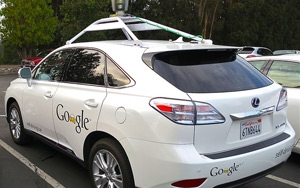Commentary
Automotive Giants Meet To Further Standards For In-Vehicle Data
- by Laurie Sullivan , Staff Writer @lauriesullivan, October 7, 2015
 Mapping and location-based technologies will become critically important as self-driving cars from Audi, BMW, Google, Ford, Honda and many more automakers take to the road.
On Wednesday, Nokia announced its mapping technology HERE, and automotive industry leaders like Fiat Chrysler, Ford Motor Co, General Motors, INRIX, Robert Bosch GmbH, and TomTom met in Auburn
Hills, Mich., to continue their work to accelerate the development of automated driving and ensure the results are available globally.
Mapping and location-based technologies will become critically important as self-driving cars from Audi, BMW, Google, Ford, Honda and many more automakers take to the road.
On Wednesday, Nokia announced its mapping technology HERE, and automotive industry leaders like Fiat Chrysler, Ford Motor Co, General Motors, INRIX, Robert Bosch GmbH, and TomTom met in Auburn
Hills, Mich., to continue their work to accelerate the development of automated driving and ensure the results are available globally.
The future for location-based and in-vehicle data doesn't begin and end with a search query through an on-board WiFi connection in the dashboard. With a standard format for this data, vehicles of all types will transmit information in real-time to the cloud about road conditions to improve safety for drivers.
Some might view this as an invasion of privacy, but apps like Wave and built-in features like OnStar already do something similar. The data generated would be analogous regardless of vehicle manufacturer. The auto and other industries such as law enforcement could would pool, process and analyze it quickly to create a detailed live view of traffic conditions.
CB Insights estimates more than 25 companies are working on autonomous vehicles. The list, organized in alphabetical order, starts with "A" for Apple and ends with "Y" for Yutong.
The research firm Gartner estimates that by 2018, the world will have six billion connected things requesting support. The world of data will require standards and processes for responding to significantly larger numbers of support requests communicated directly by things like cars. Responding to service requests from things will spawn new service industries.
By 2018, machines also will author about 20% of business content and data, and through 2020 customers will cause about 95% of cloud security failures, per Gartner.
The more data and automation will force the automotive industry to forge standards and processes. At the automotive event participants discussed technical issues such as data content, security, anonymization, technical accuracy and efficiency.
They also addressed how best to hand over the specification to a neutral standards body to ensure cooperation among all industry players globally. HERE had initial discussions with two leading standards organizations on the swift handover of the initial proposed specification, which has been made available through a creative commons license.



